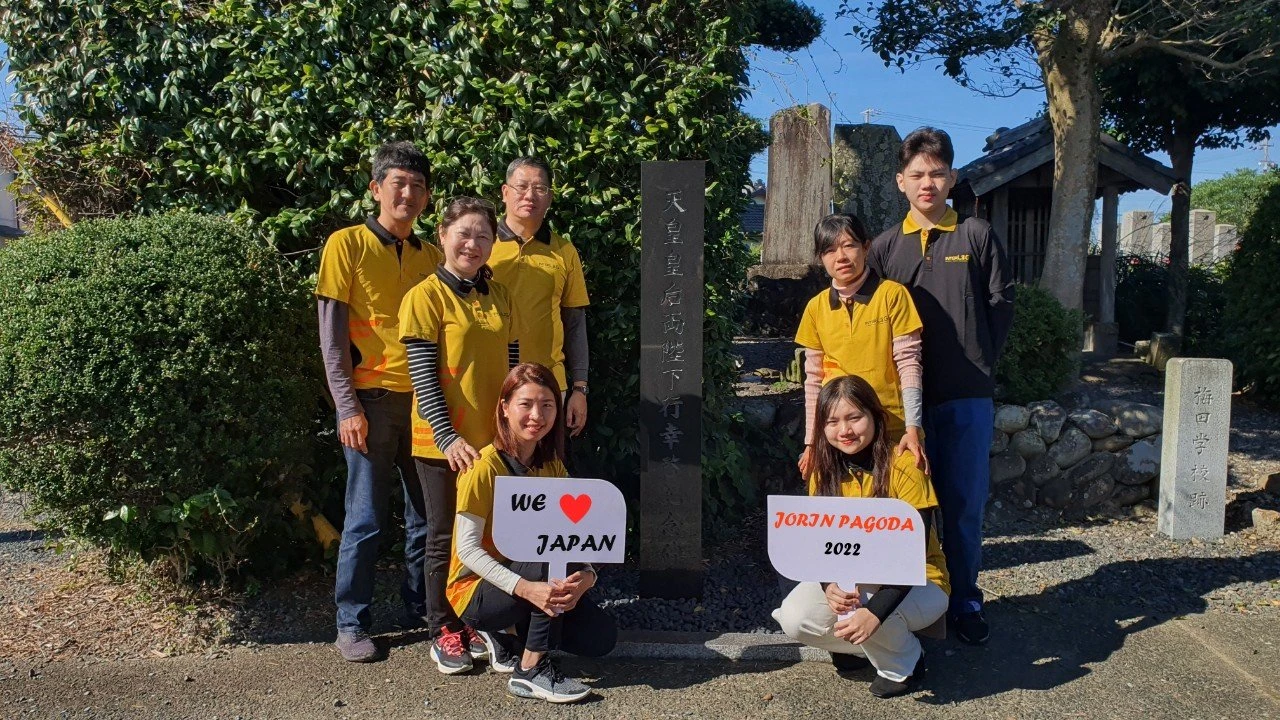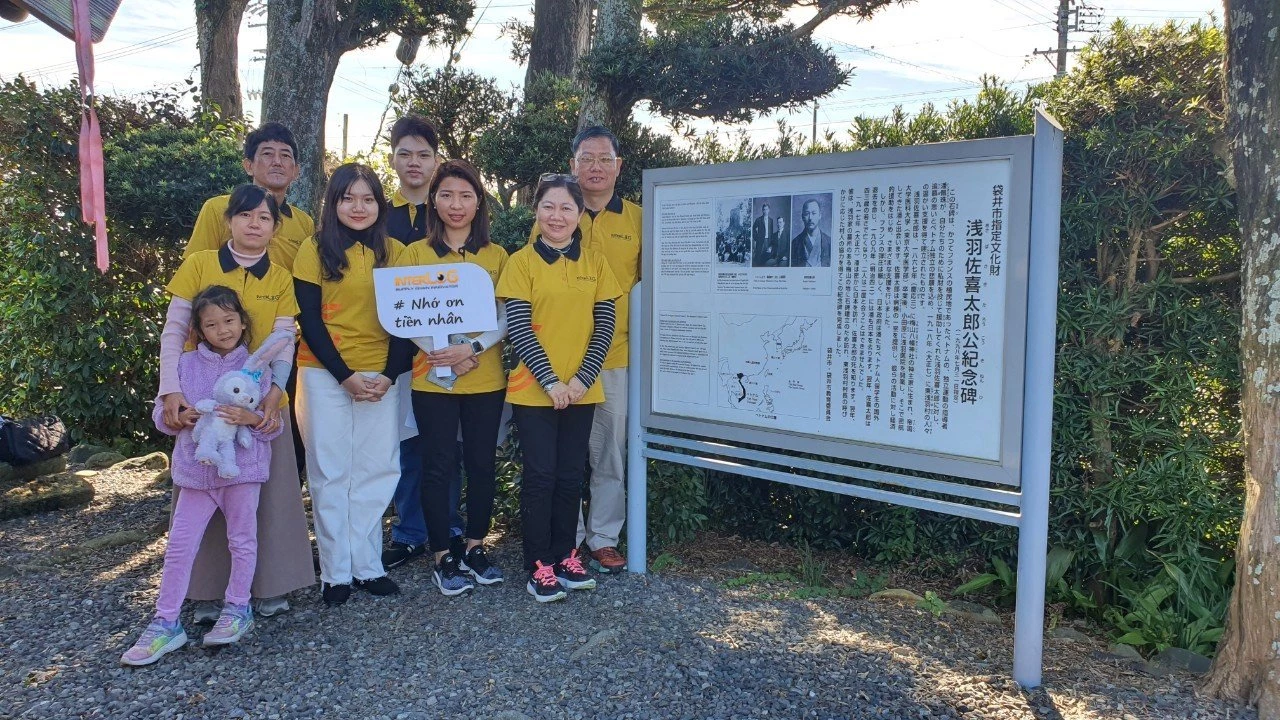


In gratitude to Dr. Asaba Sakitaro - Benefactor of the Dong Du Movement
In November 2022, the InterLOG team conducted a business trip in Japan from November 4th to November 12th, 2022. This trip left many members deeply touched and impressed.
Of particular note, the InterLOG team visited the memorial stone for Dr. Asaba Sakitaro, erected in 1918 at Jorin Temple by patriot Phan Boi Chau and the villagers of Higashi Asaba, Fukuroi City, Shizuoka Prefecture, Japan. The Jorin Temple - ji is located beyond the temple gate in a cool, serene, and exquisite garden. Led by the temple's abbot, the InterLOG team was guided deep into the temple grounds where the 2.7m high, 0.87m wide stone monument in memory of Dr. Asaba Sakitaro stood, firm, serene, bearing the marks of time. The stone inscription reads, "None are as noble as you, your virtue enveloping all. You help like the sky, I endure like the sea. My will is not yet fulfilled, you do not wait. The pain in my heart is endless, lasting for a thousand years." These personal reflections suddenly plunged our entire group into deep contemplation.

From historical records, the bond between patriot Phan Boi Chau and Dr. Asaba Sakirato originates from the countless challenging days of the Dong Du movement. The founding context of the Dong Du movement is as follows: In 1868, the Meiji Restoration - Japan's period of modernization. Japan established numerous schools with diverse curricula (ranging from general knowledge to military training), encouraged the study of foreign literature, and promoted studying abroad. In Vietnam, consecutive uprisings against the French failed, causing despair among the people. Phan Boi Chau founded the Dong Du Association, along with other patriots, directing their aspirations towards Japan with courage and determination to learn, seek improvement, and save the country, liberating the nation - one of the most significant journeys in Vietnamese history.
Patriot Phan Boi Chau chose Japan as the destination for the journey to save the country and liberate the Vietnamese people in the late 19th and early 20th centuries.
Cause number 1: Phan Boi Chau perceived many similarities between Vietnam and Japan (same continent, equivalent in territorial area and population, both threatened by foreign powers, yet Japan maintained sovereignty, undertook reforms for outstanding development). Phan Boi Chau admired the qualities of honesty, self-respect, self-esteem, discipline, and strong unity spirit of the Japanese people.
Cause number 2: Phan Boi Chau desired to learn fundamentally and comprehensively about the new path, the new development model of Asia in which Japan was a pioneer. The Japanese government then had progressive policies for the people, opening numerous schools teaching military knowledge, including naval and army training, sending individuals abroad for further learning. This was a model of a state combining the "separation of powers" system from the West with the practical conditions of Japan.
Cause number 3: Traveling to Japan, Phan Boi Chau aimed to leverage the support of the Japanese authorities for the national liberation and independence of Vietnam. He viewed Japan as a progressive and advanced nation. His plan was to persuade them to assist the cause.

However, reality proved to be challenging. In January 1905, Phan Boi Chau and the first Vietnamese students traveled to Japan. Their educational journey received support from many patriotic Japanese individuals like Okumura, Kashiwabara Buntaro, and Dr. Asaba Sakitaro. The number of students reached 200. The curriculum was diverse, ranging from general knowledge to military training. By June 1907, France and Japan signed the Franco-Japanese Treaty in Paris; in August 1908, the Japanese government expelled Vietnamese patriots, including Phan Boi Chau, to comply with the agreement respecting each other's colonial territories in the Asia-Pacific region. The Dong Du movement's activities dwindled due to financial strains, leading to its eventual conclusion.
At this point, Phan Boi Chau boldly wrote a letter seeking Dr. Asaba's compassion. Unexpectedly, by the evening of the same day, a response arrived. Dr. Asaba Sakitaro sent Phan Boi Chau 1,700 yen (equivalent to $200,000), along with a heartfelt message: "This is all I have for now. If you need more in the future, do not hesitate to ask. I will do what I can." Phan Boi Chau used this money to arrange for the return of many students and went into exile in China and Thailand. On September 25, 1910, Asaba Sakitaro passed away due to pneumonia. In the spring of 1918, Phan Boi Chau returned to Umeyama village to propose the erection of a monument in honor of Dr. Asaba Sakitaro. Within a month, the stone monument was completed.
The great compassion shown by Dr. Asaba Sakitaro towards the foreigner Phan Boi Chau, as well as the profound gratitude expressed through the erection of the monument, and Phan Boi Chau's courageous journey abroad to save the country, make us feel small in front of our predecessors, requiring more efforts to improve ourselves in work and life: more heroism to blend into the vast world, more courage to face new challenges, and constant appreciation for what we have.


